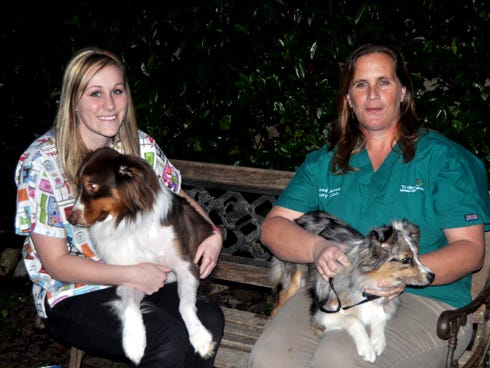
CRESTVIEW — Employees at the Dogwood Acres veterinary clinic recently had the opportunity to give some advice to pet owners.
Ami Johnson, a certified veterinary technician, and Kristy Guthre, head receptionist of the clinic recently sat down with the Crestview News Bulletin to discuss what pet owners should know to keep their pets healthy.
Parvovirus
One deadly threat that Dogwood Acres' patients experience increasingly is parvovirus, Johnson said.
"It basically dehydrates (dogs) until they die; it affects the intestinal track and the stomach," she said. Symptoms are vomiting and diarrhea.
Dogs can contract the virus — typically transmitted through animal feces — from soil, which can incubate it up to a year.
A series of about four vaccinations per year can help protect dogs, Johnson said, adding the vaccines must be kept cold to work.
To ensure effectiveness, people should vaccinate their pets before introducing their companions to a new environment or strangers, she said.
Vaccines cost about $20 each, which is less than paying for medical treatments should health problems arise, Johnson said.
Heartworms
Heartworms — spread from host to host through mosquito bites — result from larvae entering dogs' bloodstream.
Within six months, the larvae can form adult heartworms, which can damage canines' hearts.
"Heartworms around here are all year round because it does not get cold enough to kill mosquitoes," Guthre said.
Preventive medication can be purchased at retail stores and veterinarian clinics.
Dogs affected by heartworms can be treated, but the cost exceeds that of preventive medications, which run from about $8 to $10 a month, depending on the dog's size.
Conversely, heartworm treatment injections can range between $500 and $900, depending on the dog's size.
Rabies
Humans bitten by animals infected with rabies can die without immediate treatment. The virus attacks the central nervous system and carries symptoms including depression, sensitivity to touch, painful swallowing and drooling, according to the U.S. National Library of Medicine.
Due to the risk, the law requires pets to receiveregular rabies shots from licensed veterinarians.
"They should start getting rabies vaccinations once a year," Johnson said. "After the first couple of years, they have the option of getting a three-year shot."
Dogs, cats and ferrets must be vaccinated starting at 4 months old, under Florida statutes, which require owners to receive vaccination certificates.
A pet may be exempt from a rabies shot if a licensed veterinarian provides documentation stating the shot would harm that pet. However, that pet should receive the shot as soon as it can.
"There is no cure for rabies; once you get it, you die," Johnson said.
Exercise
Several factors — including the dog's size, how much the animal eats and how active it is — play into how much dogs should exercise, Johnson said.
However, a rule of thumb is that "they usually should be walked for 30 to 45 minutes a day," she said.
Owners taking their dogs to a dog park should be cautious of the other dogs.
"One thing you want to think about when you get all of those dogs together is their vaccinations," Johnson said.
Even if the dog park has a sign posted requesting all dogs be vaccinated, it won't deter those who are not.
"Everyone should be honest about that, but some people are not," Johnson said.
The closest dog park for Crestview residents, outside of apartment complexes' offerings, is in Niceville. The city's Community Redevelopment Agency has discussed the possibility of adding such a facility in Twin Hills Park along with a skate park. The CRA is expected to present proposed plans at their next yet unscheduled meeting.
A dog park may be unsuitable for dogs considered antisocial.
"Each dog is different, and it depends on what they have been through," Guthre said. "Some may have been left in crates all of their lives and that's all they know.
"They are either comfortable with it, or they have anxiety because (of being outside) of it."
Dog training classes can help these dogs become more sociable, Johnson said.
Diet
For pet owners unsure of how much to feed their pets, the answers appear on the brand of dog food they purchase.
Each bag of dog food has a chart that tells the preferred amount of food for each animal depending on the dog's age and weight.
But knowing how much to feed animals isn't enough; you also need to know what not to feed them — generally, that includes table scraps.
"Animals don't metabolize people food the way (humans) do," Johnson said. "(Dogs) can get what is called pancreatitis, which is when the pancreas becomes inflamed."
Pancreatitis can lead to other health problems including diabetes, Johnson said. However, these problems can be avoided if the animal keeps a healthy weight.
"The less (fat) your pet has, the longer they will live," Johnson said.
Ultimately, maintaining a dog's health should be considered the same way humans maintain theirs: with annual check-ups, Johnson said.
"Bringing them in for annual exams either once or twice a year would be beneficial," Johnson said.
For dogs over the age of seven, it is recommended that they are brought in for check ups twice a year.
"The older dogs get, the more often they should have check ups," Johnson said.
Contact News Bulletin Staff Writer Matthew Brown at 850-682-6524 or matthewb@crestviewbulletin.com. Follow him on Twitter @cnbMatthew.
This article originally appeared on Crestview News Bulletin: PUPPY LOVE: Pet specialists give advice on pet health
